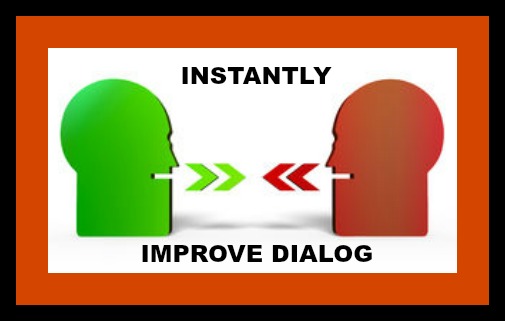Yes, there really are 50 words writers use all the time instead of said. Words that should never be used to replace said.
This common mistake by new writers, need not be a mistake you make. Find out what these words are and why you should never use them. Writing effective, compelling dialog is not easy.
This post will show you several tricks to write dynamic dialog.
Contents: What is a Dialog (Speech) Tag?
Punctuating dialog (with info graph)
More expressive verbs can change the meaning of your dialog.
Adverbs can express emotion in dialog.
Dialog is an essential part of storytelling.
List of 240 words to replace said
50 words NOT to use to replace said.
How to use these 50 words correctly in dialog.
What is a Dialog (Speech) Tag?
Let’s start at the beginning. The purpose of speech tags is to identify the speaker. It’s vital for your reader to knows who is talking. Usually that means having a dialog tag before, after, or in the middle of the first line of dialog.
Speech tags help avoid confusion for your reader.
Here’s how it works. A tag contains a noun or pronoun (example: Bill, Jane, She, President, or wife) and a verb (said, ask, whispered, shouted).
It does not matter whether the noun or pronoun comes first. Example: Jane replied, She replied,
Or the verb comes first. Example: whispered Jane, Whispered she.
Both are correct. I don’t know about you, but I don’t like the verb first with a pronoun. Even if it is correct grammar.
The key is to strive to be consistent.
Here are a few things we want to share with you before we get to the list.
Punctuating Dialog
Punctuating dialogue can be difficult. Its easy to forget which formatting to use for each line of dialog.
But punctuating your dialog correctly is essential if you want your story to be clear and understandable, so your reader will enjoy it.
Not to mention, knowing when to put quotation marks, periods and commas will make your text look polished and professional to agents and publishers.
Sure, you could leave it up to your editor. Just remember the more work for your editor the more expensive they will be.
It was hard for us to remember all the different rules. So we created a simple info-graph to make it easy to remember. We are offering it to you for free.
Before you leave grab your free info-graph showing:
Should you use other words Instead of Said?
In the opinion of many writers, you should only use said and ask in your dialog tags, nothing else.
I agree there is nothing wrong with using said and ask. These are not words to be avoided.
Simple tags like said, ask, replied, and inquired are kind of invisible. Most readers don’t even notice them. That can be an advantage in some ways.
Said and ask don’t distract the reader.
So why struggle to find alternatives?
- Because using the same word repeatedly is boring.
- Sometimes the dialog doesn’t express the nuances you are looking for.
- Alternate words may be more precise.
Please note: If your point can be made with words. Say it with words not fancy dialog tags. Let your dialog do the talking. Put energy into making your character’s words strong enough.
Frankly, if you can say it in words, and no tags. Do it. Or use simple speech tags.
But if you want to enliven your dialog, alternatives may be better.
John and I developed this list as a handy tool for when we were looking for something more expressive. John and I have used this list for years.
We love it. When we are looking for just the right word, we simply pull out our list. We’ve divided it into categories to make it easier.
Now, you can do the same thing. either bookmark or print the list. So, it will be available whenever you need it.

Using Other Verbs, Instead of Said Can Change the Meaning of Your Dialog.
Using other verbs may strengthen you dialog, and actually express different emotions.
There are countless verbs that can be used instead of said.
EXAMPLES:
“I can’t” she wailed
“I can’t” she confided
“I can’t” she apologized
“I can’t” she pleaded
Can you see how a replacement word for said can change the meaning of your dialog?
Using the right VERB will create more vibrant dialog
ADVERBS Can Express Emotion
Here is one secrete to better dialog. Adverbs often express feelings. So, you could use adverbs.
But here’s a better idea. Change the adverb (the LY word) to a verb. There is no need for the word “said” if you use the more expressive verb.
EXAMPLES:
Said teasingly Teased
Said worriedly Worried
Said Jokingly Joked
Said loudly Shouted, yelled, screamed
Said softly Murmured, whispered
Can you see how much stronger that is?
Writing Good Dialog is an Essential Part of Storytelling.
Dialog is the lifeblood of a story. You can improve your writing by striving to put at least some dialog on each page.
Tell your story through the words of your characters and your readers will love your writing.
Dialog can:
- Show emotion
- Advance the plot
- Provide valuable clues to your character’s personality.
- Explain motivation of a character
- Show relationships
So, try adding dialog to make your writing more interesting.
Writing dynamic dialog is a skill that can be learned.
Having a list of alternate words for said and ask, has improved our creative writing. We believe our list will help elevate your writing too.
We think this list will stimulate your thinking and fine tune your dialog tags.
If you agree, you might want to check out our PDF list of Replacement words for ASK.
In addition, alternate words may be more precise.
We hope this list of words to use instead of said will be helpful to you.
You might want to print or bookmark this post, so when you need another word for said you have a resource.
240 Words to Use Instead of SAID
Some words may be included in more than one category.
General
| Answered | replied | Addressed | Admitted | Announced |
| Agreed | Alleged | Blurted | Called | Cried out |
| Chat | Chorused | Claimed | Commented | Continued |
| Declared | Denied | Divulge | Explained | Jested |
| Joked | Lied | Mentioned | Maintained | Mimicked |
| Marveled | Quoted | Recalled | Related | Remarked |
| Responded | Related | Quipped | Informed | Told |
| Stated | Spoke | Mentioned | Promised | Quipped |
| Dictated | Repeated | Remembered | Spoke | Swore |
| Stressed | Wished | Teased | Uttered | Vowed |
| Warned | Exposed | Mocked | Commented | Testified |
| Went on and on | Disclosed | Revealed | Shared | Voiced |
| Comforted | Guessed | Interpreted | Interjected | |
Tone of Voice
| Barked | Cheered | Groaned | Bawled | Crowed |
| Cackled | Grumbled | Croaked | Mumbled | Boomed |
| Drawled | Murmured | Ranted | Wailed | Roared |
| Whispered | Sputtered | Shrieked | Stuttered | Thundered |
| Sputtered | Trumpeted | Stammered | Squeaked | Shouted |
| Grumbled | Snarled | Whined | Screamed | Sang |
| Under breath |
Argument / Anger
| Accused | Bossed | Argued | Carped | Contended |
| Advised | Declined | Commanded | Convinced | Cross examined |
| Censored | Criticized | Chided | Countered | Emphasized |
| Grumbled | Corrected | Cautioned | Challenged | Denied |
| Disagreed | Denied | Ordered | Raged | Disputed |
| Distrusted | Opposed | Protested | Interrupted | Recanted |
| Retorted | Scolded | Objected | Scoffed | Remonstrated |
| Pleaded | Sassed | Reprimanded | Proclaimed | Snapped |
| Snarled | Told off | Pointed out | Screamed | Upbraided |
| Informed | Scolded | Decided | Griped | Dubious |
| Provoked | Contested | Opposed | incited | Jabbed |
Acceptance /Acknowledge
| Accepted | Affirmed | Agreed | Acknowledged | Assumed |
| Confirmed | Admitted | Confessed | Justified | Settled |
| Understood | Verified | Approved | Avowed | Bragged |
| Conceded | Reassured | Proffered | Conceded | |
Excitement /Joy
| Babbled | Crooned | Praised | Bubbled | Declared |
| Preached | Burst forth | Exclaimed | Proclaimed | Cheered |
| Hollered | Professed | Rejoiced | Congratulated | Commented |
| Shouted | Eulogized | Lauded | Applauded | Admired |
| Trumpeted | Glorified | |||
Persuasion / Suggestion / Urge
| Advised | Coaxed | Dared | Pleaded | Hinted |
| Implied | Invited | Begged | Appealed | Assured |
| Proffered | Beseech | Asserted | Assured | Volunteered |
| Cajoled | Prescribed | Warned | Cautioned | Encouraged |
| Recommended | Insisted | Wheedled | Needled | Solicited |
| Implored | Suggested | Wooed | Entreated | Importuned |
| Urged | Proposed | Threatened | Teased | Demanded |
| Compelled | Prodded | Advised | Persuaded | Pestered |
| Pushed | Pumped | Sued | Prayed | Prompted |
| Motivated | Demanded | Coerced | Coaxed | Urged |
| Pressed | Prodded | Grilled | Pried | Probed |
| Commanded | Goaded | Beckoned | Provoked | Summoned |
| Nagged | Pried | Tempted | Enjoined | Prodded |
Look for Answers
| Examined | Asked | Entreated | Probed | Queried |
| Surveyed | Interrogated | Studied | Explored | Interviewed |
| Sought | Searched | Requested | Calculated | Suspected |
| Canvassed | Inspected | Pumped | Dug into | Solicited |
| Analyzed | Snooped | Begged | Pry | Picked his brain |
| Quizzed | Inquired | Bid | challenged | Popped the question |
| Questioned | Interrogated | Probed | Doubted | Propositioned |
| Requested | Suspected | Explored | Snooped | Tested |
| Solicited | Supplicated | Petitioned | Appealed | |
Help us add more words in comments. Down Load the PDF 240 Words To Replace Said
Words NOT to Use Instead of Said
Yes there are verbs you should never use instead of said in your dialog tags.
When we first started writing our novels, this is a mistake we made.
I wish someone had showed this to us before we had written our first book. We had to go back and fix much of our dialog.
So, here’s the problem:
Can someone belch a line of dialog. Can they smile the words. No, of course not.
Yet, oddly enough, it is easy to forget these actions can not be speech tags.
It is important for you to recognize words that should never be used in a dialog tag.
Look at the list. Many are actions. Words can’t fume, clear their throat, or jeer.
A character’s voice can quiver or tremble but not the dialog.
Hands can wave or signal. Heads can nod.
Words don’t weep, spit or seethe. Those are things the character does in the middle of the dialog.
So these words should NEVER be used instead of said in a dialog tag.
Here is the list of words you should never use Instead of Said.
Of course this isn’t all of them. But it should give you a good idea of the problem.
Belched laughed smiled clucked tongue gasped
Beamed trembled wept choked jeered
Giggled quivered shrugged coughed gulped
Chuckled grinned breathed yawned sniffed
Nodded smirked leered sneered sniffled
Snorted shivered shuddered quaked shook
Spit snickered cleared throat shook head waved
Wept growled fumed ticked off glowered
Seethed thrilled hissed signaled scowled
gurgled sighed swallowed exhaled inhaled
We created this list to remind ourselves not to make this mistake.
Since, these are not all of the words to watch for, you should be mindful of not using actions instead of said in speech tags.
Download this list as a PDF cheat sheet:
Words never to use in dialog tags
How to Use These 50 Words Correctly In Dialog
Let me explain; the correct way to use these words. Use them in a separate sentence woven in between the dialog.
These words do help your reader visualize your character’s conversations. They just need to be used properly. Isn’t that what we all want to learn?
In case your wondering how this works, here are some examples.
EXAMPLES:
WRONG: “I don’t see why not, “Chen smiled
CORRECT: Chen smiled. ” I don’t see why not.”
WRONG: “Of course we can,” Denise giggled.
CORRECT: “Of course we Can.” Denise giggled.
WRONG: “I’m Serious, “Chen nodded. “We can do this.”
CORRECT “I’m serious,” said Chen and nodded. “We can do this.”
As you can see to use these words correctly is mostly a matter of punctuation.
Don’t forget to share our lists. It’s just a few clicks.
You’ll be helping others find this list and use the information.
Another Website to check out: https://www.merriam-webster.com/thesaurus/said
Remember to download our PDF 78 Replacement Words for Ask
And 240 words to replace Said
Happy Writing
John & Patty @writingagreatbook.com 2018




